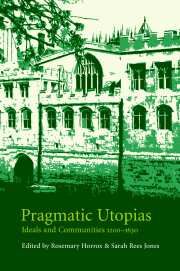Book contents
- Frontmatter
- Contents
- Preface
- List of abbreviations
- Richard Barrie Dobson: an appreciation
- 1 ‘If heaven be on this earth, it is in cloister or in school’: the monastic ideal in later medieval English literature
- 2 The ‘Chariot of Aminadab’ and the Yorkshire priory of Swine
- 3 Godliness and good learning: ideals and imagination in medieval university and college foundations
- 4 Hugh of Balsham, bishop of Ely 1256/7–1286
- 5 A cruel necessity? Christ's and St John's, two Cambridge refoundations
- 6 Coventry's ‘Lollard’ programme of 1492 and the making of Utopia
- 7 Thomas More's Utopia and medieval London
- 8 Social exclusivity or justice for all? Access to justice in fourteenth-century England
- 9 Idealising criminality: Robin Hood in the fifteenth century
- 10 Fat Christian and Old Peter: ideals and compromises among the medieval Waldensians
- 11 Imageless devotion: what kind of an ideal?
- 12 An English anchorite: the making, unmaking and remaking of Christine Carpenter
- 13 Victorian values in fifteenth-century England: the Ewelme almshouse statutes
- 14 Puritanism and the poor
- 15 Realising a utopian dream: the transformation of the clergy in the diocese of York, 1500–1630
- Bibliography of Barrie Dobson's published works
- Index
12 - An English anchorite: the making, unmaking and remaking of Christine Carpenter
Published online by Cambridge University Press: 01 July 2009
- Frontmatter
- Contents
- Preface
- List of abbreviations
- Richard Barrie Dobson: an appreciation
- 1 ‘If heaven be on this earth, it is in cloister or in school’: the monastic ideal in later medieval English literature
- 2 The ‘Chariot of Aminadab’ and the Yorkshire priory of Swine
- 3 Godliness and good learning: ideals and imagination in medieval university and college foundations
- 4 Hugh of Balsham, bishop of Ely 1256/7–1286
- 5 A cruel necessity? Christ's and St John's, two Cambridge refoundations
- 6 Coventry's ‘Lollard’ programme of 1492 and the making of Utopia
- 7 Thomas More's Utopia and medieval London
- 8 Social exclusivity or justice for all? Access to justice in fourteenth-century England
- 9 Idealising criminality: Robin Hood in the fifteenth century
- 10 Fat Christian and Old Peter: ideals and compromises among the medieval Waldensians
- 11 Imageless devotion: what kind of an ideal?
- 12 An English anchorite: the making, unmaking and remaking of Christine Carpenter
- 13 Victorian values in fifteenth-century England: the Ewelme almshouse statutes
- 14 Puritanism and the poor
- 15 Realising a utopian dream: the transformation of the clergy in the diocese of York, 1500–1630
- Bibliography of Barrie Dobson's published works
- Index
Summary
In July 1993 Barrie Dobson and I attended the world première of the film The Anchoress, directed by Chris Newby, at the Arts Cinema in Cambridge. After the screening Barrie offered a few thoughts to the audience: he was as much at ease talking about the film as he always is in more conventional settings for historical discussion. It is the wide interests, the humour and curiosity about people, the gentle engagement so characteristic of Barrie, which I wish to salute in this article by bringing together two of Barrie's passions: film and late medieval religion.
Joining the new University of York in 1964, Barrie threw his energies and talent into helping to create one of the best medieval history centres in the world. He was a passionate lover of film, yet around him in York, as elsewhere, cinemas were being closed down. Soon after his arrival in York a chance glance at an advertisement in the local newspaper brought Barrie to the York Film Society's Annual General Meeting. At that, his first meeting, Barrie became a committee member, and within a fortnight, the Society's Secretary. Desperate to enliven his new charge, Barrie wrote off to the British Film Institute with a vague hope for some support or advice. Little did he expect the warm embrace in which he became enfolded: his letter coincided with one of Harold Wilson's pet initiatives, a policy for art in the regions which allocated funding and dedicated expertise.
- Type
- Chapter
- Information
- Pragmatic UtopiasIdeals and Communities, 1200–1630, pp. 204 - 223Publisher: Cambridge University PressPrint publication year: 2001
- 1
- Cited by



